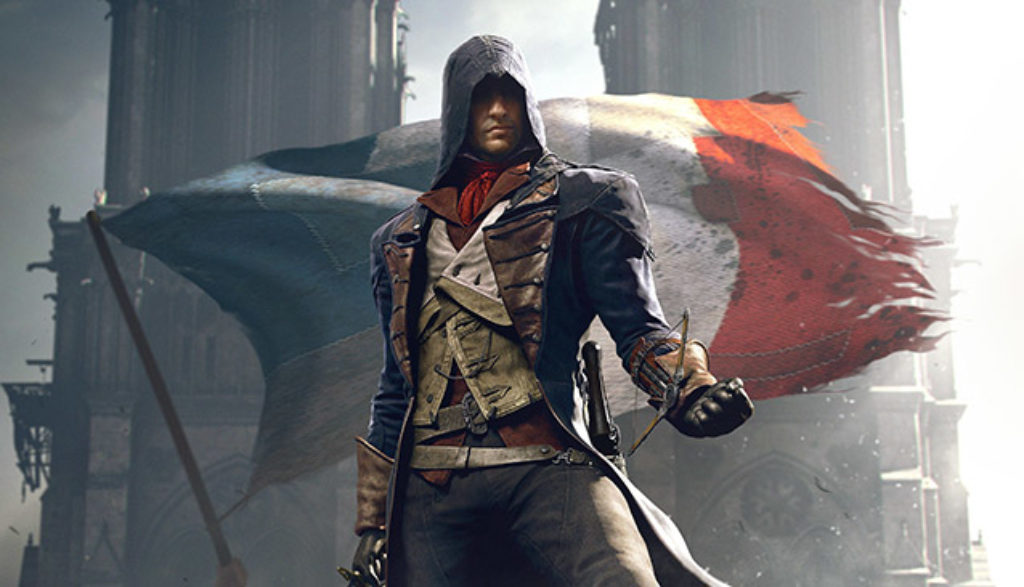
Since its introduction in 2007, the Assassin’s Creed franchise has been cranking out a steady parade of historically based sneak-and-slash games. Gamemaker Ubisoft’s Unity installment is the first released for the next-gen PlayStation 4 and Xbox One consoles … which means it will play out as a révolutionnaire update and just another stab at back-alley stabbing. Pouah! Read on for les détails sordides.
Liberté and Lies
As if I haven’t yet dropped enough clues, I should tell you now that the action of Assassin’s Creed: Unity takes place in Paris during the tumultuous times leading up to the French Revolution. But this isn’t a pure history lesson on revolt and king-beheading. As with all the other Assassin’s Creed games, there’s quite a bit of creative license taken and at least a modicum of futuristic techiness in the story mix too.
In this case it’s implied that you have been plugged into a futuristic “gaming” device that allows you to tap into your own DNA and romp through the genetic memories of your ancestors. But just as your “play” gets going, it’s interrupted by a secretive woman who breaks into the digital stream and reports that the console-makers—a shadowy corporation called Abstergo—is surreptitiously trying to mine your DNA for some sort of power-snatching scheme. She and others are trying to thwart them and want to recruit you to help find some special triple-helix secrets that are hidden somewhere in the corpse of a mysterious 18th-century man.
Starting to feel a bit confused? Don’t worry, that’s par for the course with this franchise. So just think of things this way: There’s an ongoing power-struggle/war between a cultish religious group (called the Templars) and a brotherhood of assassins. You dive into that debacle as an assassin initiate named Arno.
There’s a love story in the mix, a fevered desire for personal revenge, a spider web of political intrigue and even a number of pop-up, real world historical figures to interact with—such as Napoleon and a quirky Marquis de Sade. But who really cares about all that? What Assassin’s Creed: Unity is really consumed with are 20 to 25 hours of assassination missions in an impressively well-defined 1700s Paris.
Choose. Kill. Choose. Kill.
Arno is assigned a series of vengeful and clue-seeking murders to commit. And so you must often assess the surrounding environments and figure out the best way to sever somebody’s spine or slice open a jugular. Do you pickpocket a key for the front door, slip in through an unlocked attic window, crawl up through the rank and dank sewers, smash through a window with blade and gun drawn or …? The choice is fully yours. Each slaying sandbox scenario is a puzzle with at least a handful of solutions.
Creative experimentation and out-of-the-box murders are rewarded through a new in-game system called “Creed Points” that are used to upgrade armor and weapons. And for the first time in the franchise, players can customize their character through skill-tree points that can be assigned to improvements such as stealth, health, melee, etc. And Unity also introduces a cooperative multiplayer mode. You can enter taverns and look for the ghost-like images of “friends” who might be online playing the game at the same time as you. Up to four players can then team up to take on kill assignments cooperatively.
For all of the game’s graphic improvements and game-mechanic tweaks, though, Unity is still all about sneaky death-dealing, and it still goes about that business with brutal panache. Amidst spattered spews of crude language, f- and s-words, and misuses of Jesus’ and God’s names, we see a man’s head, for instance, paraded around after being freshly lopped off by a guillotine. Another’s foot is roughly hacked free with a dull blade. A bullet rips a hole through a fellow’s jaw. And enemies have swords and knives plunged into their heads, throats and torsos. Rifles, pistols, bombs and poisons take their toll.
When the violence gives way to sexual stuff, we watch kissing and groping. Women display their digital cleavage, and a man bares his butt. The Marquis de Sade is presented as something of a quip-tossing pimp who chucks out barbs about lecherous priests, seductive nuns and bestiality.
Are there consequences for all the carnality and corporeal calamity in this Creed creation? Not really, unless you call “having fun” a consequence. “No higher power watches over us” or judges our sins, Arno tells us in a bleak narration. “All that we do, all that we are, begins and ends with ourselves.”
Ultimately, then, this next-gen Assassin’s Creed feels less like la révolution than it does yet another high-tech excuse for gamers to traverse the rooftops (and sewers) of a wonderfully rendered historical backdrop while letting loose their inner id. For all the sneaking around you do, there isn’t much subtlety here. Confusion, yes, but only of the very obvious and gory sort.

After spending more than two decades touring, directing, writing and producing for Christian theater and radio (most recently for Adventures in Odyssey, which he still contributes to), Bob joined the Plugged In staff to help us focus more heavily on video games. He is also one of our primary movie reviewers.